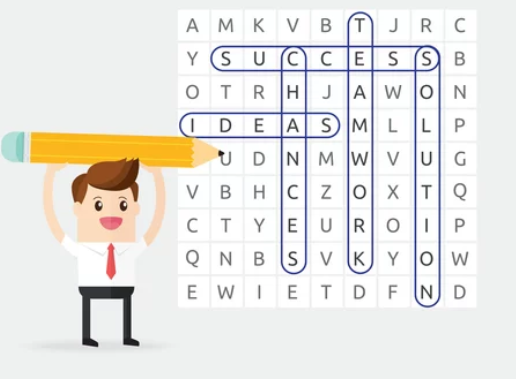In today’s fast-paced world, cognitive skills such as memory and focus are more important than ever. One engaging and effective way to boost these skills is through word search puzzles. These seemingly simple games offer numerous educational benefits, making them a valuable tool for learners of all ages. In this blog post, we will explore how word search puzzles enhance memory and focus, delving into the cognitive processes involved and the practical applications of these puzzles in educational and therapeutic settings.
The Cognitive Benefits of Word Search Puzzles
1. Memory Enhancement
Word search puzzles primarily engage the brain’s memory functions. Here’s how:
a. Short-term Memory Use
When you approach a word search, your brain relies heavily on short-term memory to remember the list of words you need to find. This process of retaining information briefly helps to exercise your brain and improves your ability to hold information for short periods, which is essential in daily tasks and learning environments.
b. Long-term Memory Reinforcement
As players repeatedly engage with word search puzzles, they begin to reinforce their long-term memory. By encountering familiar words within the context of the puzzle, individuals strengthen their associations with these words. This is especially beneficial for language learners or individuals working to expand their vocabulary.
2. Improved Focus and Concentration
The task of locating words in a word search requires sustained attention and concentration. Here’s how this activity sharpens these skills:
a. Task-Oriented Focus
Word searches demand a task-oriented focus. Players must concentrate on the grid, scanning it for specific letters and patterns. This focused attention fosters an ability to concentrate on tasks without becoming easily distracted, a crucial skill in both academic and professional settings.
b. Filtering Out Distractions
Completing a word search involves filtering out extraneous information. As players hone in on the letters that form the target words, they practice ignoring surrounding distractions. This skill translates well to other areas of life, such as studying or working in busy environments.
The Mechanisms Behind Memory and Focus Enhancement
Understanding the underlying cognitive mechanisms can provide insight into how word search puzzles are beneficial.
1. Visual Processing
Word search puzzles require players to utilize visual processing skills. The brain’s ability to quickly recognize and interpret visual information is critical for completing these puzzles. When scanning the grid, individuals engage their visual memory, training their brains to identify patterns and letter combinations more efficiently.
2. Pattern Recognition
Finding words in a grid is fundamentally about recognizing patterns. The brain excels at identifying recurring themes and structures, and engaging with word searches helps reinforce this skill. Improved pattern recognition can benefit learners in various subjects, from math to reading comprehension.
3. Engagement and Motivation
The interactive nature of word search puzzles keeps players engaged. When learners are motivated and interested in an activity, their cognitive processes are more active, enhancing memory retention and focus. This intrinsic motivation makes word searches an enjoyable learning tool.
Free English/Literacy Worksheet Generators
Practical Applications of Word Search Puzzles
1. In Educational Settings
Word search puzzles can be effectively integrated into classroom activities:
a. Vocabulary Building
Teachers can create word searches that include vocabulary words from lessons, reinforcing learning while making the process fun. This method allows students to engage with new words in a low-pressure context.
b. Thematic Learning
Educators can use themed word searches to reinforce learning in specific subjects, such as science or history. For example, a word search focused on biological terms can help students familiarize themselves with important concepts in a playful way.
2. In Therapeutic Contexts
Word search puzzles also have therapeutic benefits:
a. Cognitive Rehabilitation
For individuals recovering from brain injuries or strokes, engaging with word search puzzles can aid cognitive rehabilitation. These puzzles can help rebuild memory and focus skills in a supportive, enjoyable manner.
b. Stress Relief
Solving word search puzzles can serve as a form of mindfulness and stress relief. The act of focusing on the puzzle can distract individuals from anxiety and promote relaxation, making it a valuable tool in stress management programs.
Tips for Maximizing the Benefits of Word Search Puzzles
To fully leverage the cognitive benefits of word search puzzles, consider the following tips:
1. Choose Appropriate Difficulty Levels
Select puzzles that match the skill level of the participants. Too easy, and they won’t engage; too hard, and they may become frustrated. Gradually increasing the complexity of puzzles can provide a sense of accomplishment and keep players motivated.
2. Incorporate Regular Practice
Consistent engagement with word search puzzles is essential for seeing cognitive benefits. Incorporate them into daily routines, whether as a warm-up exercise in the classroom or a relaxing activity at home.
3. Encourage Group Activities
Word searches can also be a great social activity. Encourage group puzzles to promote collaboration and discussion, fostering social skills alongside cognitive benefits. Group activities can also make the process more enjoyable and reduce stress.
4. Use Digital Tools
Many online platforms offer customizable word search generators. These tools allow users to create personalized puzzles tailored to specific themes or vocabulary lists, enhancing the educational experience. Digital platforms also often track progress, providing insights into cognitive improvements over time.
Free Math and English Worksheet Generators
Word search puzzles are not just a fun pastime; they are powerful tools for enhancing memory and focus. By engaging visual processing, promoting pattern recognition, and providing motivation, these puzzles can significantly contribute to cognitive development. Whether used in educational settings, therapeutic contexts, or at home, word search puzzles offer a versatile solution for individuals looking to improve their cognitive skills. Embrace the challenge of a word search today and unlock the benefits of better memory and focus!
